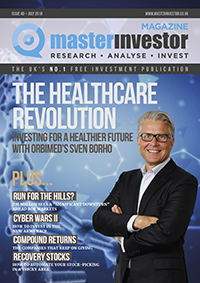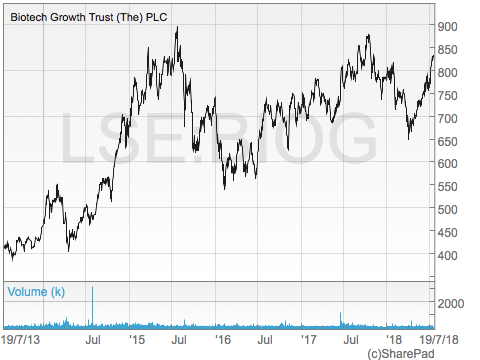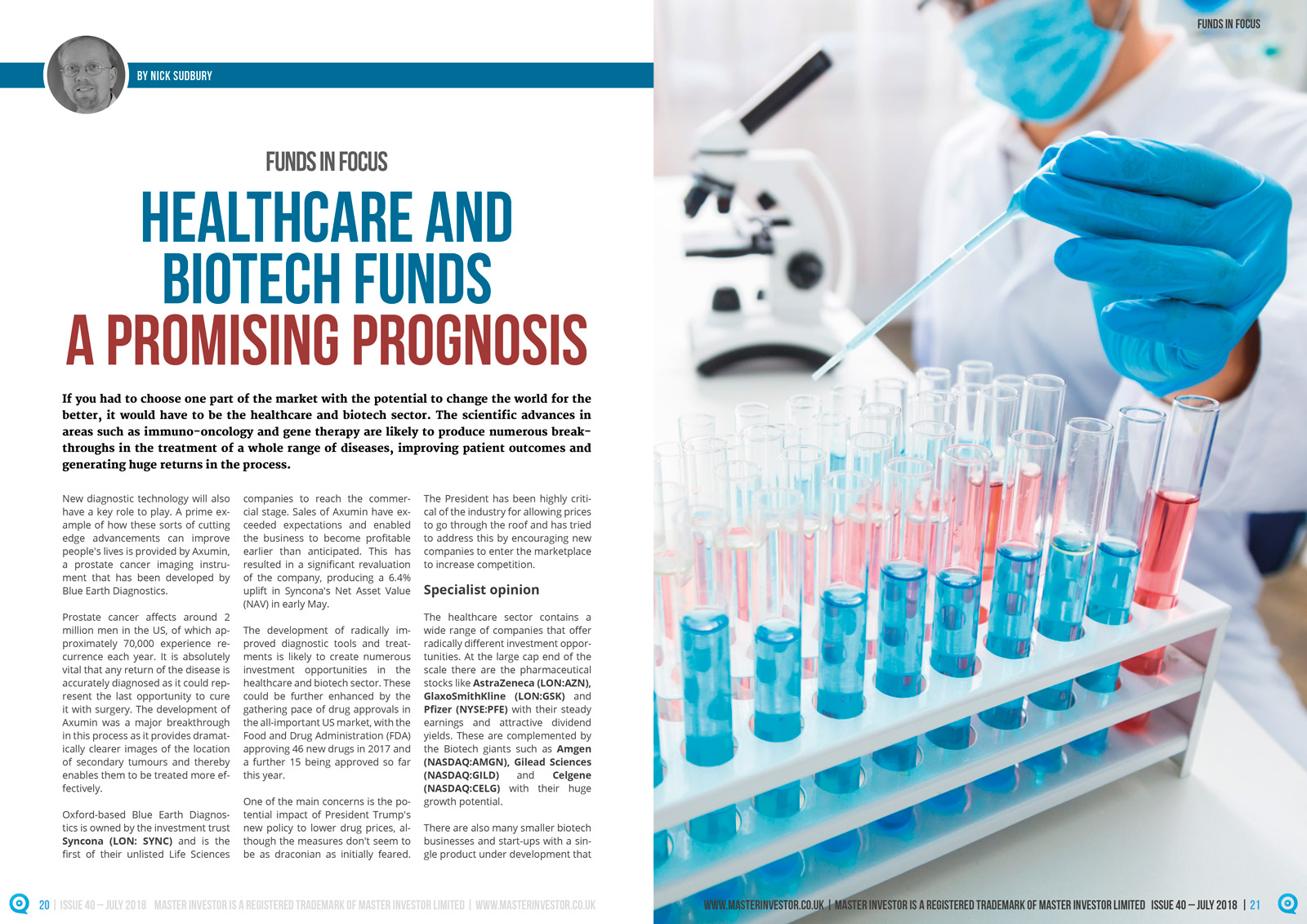Healthcare and Biotech funds: A promising prognosis – MAGAZINE EXCLUSIVEMAGAZINE EXCLUSIVE

MAGAZINE ARTICLE
This article first appeared in Issue 40 of Master Investor Magazine.
Click here to download the article as a printer-friendly PDF

Get this article and many more – for free! |
If you had to choose one part of the market with the potential to change the world for the better it would have to be the healthcare and biotech sector. The scientific advances in areas such as immuno-oncology and gene therapy are likely to produce numerous breakthroughs in the treatment of a whole range of diseases, improving patient outcomes and generating huge returns in the process.
New diagnostic technology will also have a key role to play. A prime example of how these sorts of cutting edge advancements can improve people’s lives is provided by Axumin, a prostate cancer imaging instrument that has been developed by Blue Earth Diagnostics.
Prostate cancer affects around 2 million men in the US, of which approximately 70,000 experience recurrence each year. It is absolutely vital that any return of the disease is accurately diagnosed as it could represent the last opportunity to cure it with surgery. The development of Axumin was a major breakthrough in this process as it provides dramatically clearer images of the location of secondary tumours and thereby enables them to be treated more effectively.
Oxford-based Blue Earth Diagnostics is owned by the investment trust Syncona (LON:SYNC) and is the first of their unlisted Life Sciences companies to reach the commercial stage. Sales of Axumin have exceeded expectations and enabled the business to become profitable earlier than anticipated. This has resulted in a significant revaluation of the company, producing a 6.4% uplift in Syncona’s Net Asset Value (NAV) in early May.
The development of radically improved diagnostic tools and treatments is likely to create numerous investment opportunities in the healthcare and biotech sector. These could be further enhanced by the gathering pace of drug approvals in the all-important US market, with the Food and Drug Administration (FDA) approving 46 new drugs in 2017 and a further 15 being approved so far this year.
One of the main concerns is the potential impact of President Trump’s new policy to lower drug prices, although the measures don’t seem to be as draconian as initially feared. The President has been highly critical of the industry for allowing prices to go through the roof and has tried to address this by encouraging new companies to enter the marketplace to increase competition.
Specialist opinion
The healthcare sector contains a wide range of companies that offer radically different investment opportunities. At the large cap end of the scale there are the pharmaceutical stocks like AstraZeneca (LON:AZN), GlaxoSmithKline (LON:GSK) and Pfizer (NYSE:PFE) with their steady earnings and attractive dividend yields. These are complemented by the Biotech giants such as Amgen (NASDAQ:AMGN), Gilead Sciences (NASDAQ:GILD) and Celgene (NASDAQ:CELG) with their huge growth potential.
There are also many smaller biotech businesses and start-ups with a single product under development that could produce a radical new treatment or fail without trace, as well as lots of more established companies providing healthcare equipment and managed healthcare services.
This is a complex and specialist area where a knowledgeable fund manager should be able to add significant value via their stock selection decisions, but there are only a handful of investment trusts and open-ended funds that concentrate specifically on this part of the market.
According to data from Winterflood Securities, there are just six investment trusts operating in the sector, and between them they have total assets of almost £4 billion. The two largest, at over £1 billion each, areSynconaand the Worldwide Healthcare Trust (LON:WWH). Over the last five years, the six funds have generated an average share price total return of 117%.
Investment trusts are closed-ended, with investors able to buy and sell the shares on the London Stock Exchange without any cash flow implications for the underlying holdings. This gives them a major advantage as it enables the fund managers to invest a greater proportion of their assets in illiquid securities such as the thinly traded small caps or the unquoted biotech businesses that offer the greatest potential returns.
Safe pair of hands
The Worldwide Healthcare Trust has the most diversified portfolio in the sector with 75 separate holdings, of which the top ten account for 35% of the assets. It was launched in April 1995 and has been managed throughout by OrbiMed, a leading global healthcare investor with around $14 billion of assets under management.
Sam Islay, OrbiMed’s founder and managing partner, announced his retirement last December following allegations of improper behaviour, but Sven Borho, WWH’s long-term co-manager, remains in place, so there should be little impact on the day to day running of the fund. OrbiMed is well-resourced with around 82 investment professionals and this enables it to identify opportunities right across the sector.
A key part of their strategy is to identify catalysts that will lead to a major re-rating of the shares, such as a successful clinical trial, a positive regulatory decision by the FDA or the launch of a new drug.
The manager believes that the sector – which is largely dominated by US stocks − will benefit from the American tax reforms and the repatriation of offshore cash and thinks that the tax cuts will lead to increased share buybacks, higher dividends and more M&A activity. WWH has generated a ten-year share price return of 559% and the shares are currently trading close to NAV.
Open-ended funds
The largest open-ended healthcare fund, according to FE Trustnet, is BlackRock GF World Healthscience,with around $2.9 billion in assets under management. At least 70% of its portfolio is invested in the sector and this has enabled it to generate a creditable five-year return of 109.9%. The biggest Biotech fund is Franklin Biotechnology Discovery,with $2.3 billion of AUM. It has returned 110.6% over five years.
Focused approach
BB Healthcare (LON:BBH) raised £150 million when it was floated on the London Stock Exchange in December 2016, but subsequent share issues have boosted its total assets to a more meaningful £368 million. It is managed by Bellevue Asset Management, which also runs a highly successful Swiss-listed closed-ended Biotech fund.
The fund managers have a high conviction ‘best ideas’ approach and will only invest in a maximum of 35 stocks at any given time with no single position exceeding 10% of the assets. Their focus is on the long term with the typical investment period expected to be three to five years.
BBH’s maiden results for the period from 2nd December 2016 to 30th November 2017 were impressive, with a NAV total return of 19.3%, which was well ahead of the 14.4% achieved by the MSCI World Healthcare Index. During this time it held a total of 40 stocks, with 26 of them generating a positive contribution to the performance.
One of the most unusual aspects of the fund is its dividend policy, with the majority of the money being paid out of capital. For its first financial reporting period it targeted a distribution of 3.5 pence per share with the payments split into two equal instalments. Its policy for future periods is to distribute 3.5% of the NAV as measured at the end of the preceding financial year.
BBH has made a successful start and the shares are currently trading close to NAV, which is due in part to the annual option to redeem them at this sort of level. The target distribution for the current year is 4p per share, which gives the fund an attractive forecast yield of 3.1%.
Life changing treatments
The most unusual fund in the sector is Syncona (formerly BACIT), which launched in October 2012 with the intention of providing attractive returns for shareholders via a portfolio of funds and a growing income stream for the Institute of Cancer Research, by making significant donations to it and other charities in lieu of an annual management fee.
In December 2016, shareholders approved a resolution to change its objective to become primarily a life sciences company and to acquire Syncona Partners from the Wellcome Trust. Syncona Partners had put together a concentrated portfolio of life science investments with the fund also hiring its experienced team of investment managers.
Syncona’s new objective is to invest in and build global leaders in life science so as to deliver transformational treatments to patients in innovative areas of healthcare, while also generating superior returns for shareholders.
At the end of March, 44% of its assets were invested in various funds, with 7% in cash and 49% in eight different life science companies, including Blue Earth Diagnostics, which was mentioned earlier. The funds provide a store of capital to support the existing life science portfolio and to invest in the best new opportunities as they come along.
The focus of the life science portfolio is on ‘third wave’ technologies such as cell and gene therapy as the management team believe that these areas have the most potential to innovate and disrupt. They see a rich pipeline of opportunities, but are highly selective and will only invest where all the conditions are right, with the plan being to establish a portfolio of no more than 15 to 20 businesses.
Syncona is a unique vehicle that is backed up by the resources of the Wellcome Trust and Cancer Research UK. Its life science holdings are developing cutting edge technologies with the potential to provide important new treatments in areas of significant unmet need such as Nightstar’s gene therapy for blindness. These are difficult areas to value, but the analysts at Numis believe that its sum of parts valuation is 253p, which is well above the current share price.
FUND OF THE MONTH
The investment trust analysts at Winterflood Securities believe that the £495 million Biotech Growth Trust (LON:BIOG) is the most attractive way for risk-tolerant investors to benefit from the healthcare and biotech sector. It is managed by OrbiMed, just like WWH, although it has different lead managers who have been in place since May 2005 and provides a significantly different type of exposure.
Biotech Growth has a concentrated portfolio of 35 holdings with the top ten accounting for 69% of the assets. It has the greatest bias towards the small cap end of the spectrum of all the funds operating in this area and, according to an analysis by Winterflood conducted last year, only has about a 28% portfolio overlap with the Worldwide Healthcare Trust.
The managers have put together an exciting portfolio that consists of large biotech stocks with strong earnings and attractive valuations, emerging biotech companies with the potential to benefit from positive catalysts and early-stage businesses that are in the process of developing novel therapeutic treatments.
BIOG has a strong long-term performance record with a share price return of 632% over the last ten years, but over the last three years, it has lagged behind the sector average and its NASDAQ Biotechnology benchmark due to stock specific issues. This has resulted in the shares trading on a 7% discount to NAV, which could represent a buying opportunity for long-term investors.
Fund Facts
Name: Biotech Growth Trust (LON:BIOG)
Type: Investment Trust
Sector: Healthcare and Biotech
Total Assets: £495m
Launch Date: June 1997
Current Yield: 0%
Gearing: 9%
Ongoing Charges: 1.09%
Website: www.biotechgt.com


|
What happened to International Biotechnology Trust, or indeed BB Biotech?